- Home
- Jacob Peppers
A Sellsword's Will Page 6
A Sellsword's Will Read online
Page 6
“Forgive me, Master,” Caldwell stammered, “it is only…there are no more people of adequate…will as you say, to bring you. I have been forced—”
“No more men?” Kevlane roared, and the advisor let out a squeak of terror, looking up with wide, frightened eyes. “Do we not have an army of soldiers in Baresh, Caldwell? Those you brought from the army served my purposes well enough. Certainly better than these…” He glanced back at the corpse lying on the stone platform, and sneered. “Disgraces.”
“Yes, Master,” Caldwell said, nodding hurriedly, “and if it is your wish, I will continue to bring you subjects from the army itself. I only stopped because I felt that General Fannen was beginning to grow suspicious.”
Kevlane frowned. “That pompous fool would be too focused on standing up straight to notice if someone walked up and stole the boots from his feet, and you mean to tell me that he has taken notice?”
Caldwell swallowed hard. “Yes, Master. He has even come so far as to mention the matter to me in passing. He was not overly concerned, not yet, but I thought it prudent that we should begin to find subjects from elsewhere.”
Kevlane stared hard at the man crouched before him, and Caldwell spoke again, wincing as if he expected to be struck down. “Master, if it is your wish, I will continue to pull men from the army. My worry was only in creating difficulties that might hinder your plans. I did not mean—”
Kevlane waved a hand. “Never mind what you meant.” He considered for a moment, then shook his head. “No, Caldwell. You were right to avoid suspicion. We cannot afford such, not now, not when I am so close to achieving my goals. And what of those we have sent forth?”
The advisor nodded. “They are on their way even as we speak, Master, if they have not arrived already. We should hear more news before long.”
Kevlane grunted. “That is good, at least; Aaron Envelar will learn that it is unwise to anger a god.” He rubbed at his chin thoughtfully for a moment, “He will learn that he is not worthy of his namesake and, even if he were Aaron Caltriss remade in the flesh, he would not be able to stand against what’s coming. No one can.”
“Yes, Master,” Caldwell said, and there was such wheedling and desperation in the man’s tone that Kevlane found himself growing annoyed once more.
“Is there nothing else, Caldwell? Or did you come only to test the limits of my patience?”
“N-no sir,” he stammered. “It…it’s the general, sir.”
Kevlane frowned. “I thought we had already discussed General Fannen, and I believe that I have made it clear that, for now at least, you may postpone pulling subjects from the army. In time, once the tournament begins, and I have hundreds, perhaps even thousands with the touch of the Art upon them, it will make no difference should all the men and women of the world turn against me.”
“As you say, Master,” Caldwell said. “However, it is about another matter that I have come.”
“Well?” Kevlane demanded. “Out with it, Caldwell. I would advise that you do not test my patience further.”
“The general…he…he wishes to speak with you, My Lord.”
Kevlane’s eyes narrowed. “He wishes to speak to me?”
“Yes, Master.”
Kevlane waved a hand again. “So put him off, Caldwell. I have too much to concern myself with already without listening to the pathetic meanderings of that useless fool.”
“Yes, Master. Only, I’ve tried. But he has insisted and—forgive me if I speak out of turn—I think it would be wise for you to meet with him, if only to allay suspicions. Some of my men have brought me reports of mutterings among the Council.”
When Kevlane spoke, his tone was dangerous and cold. “Mutterings, is it?”
“Y-yes, My Lord. They do not understand why they have not been called upon in some time, particularly considering the fact that we are supposed to still be at war with the people of Perennia. They expect—”
“Expect?” Kevlane snapped, a wild, insane anger dancing in his eyes, “They dare to expect of me?” His hands clenched into fists at his sides. “I will show them the error of making demands from their god. I will teach them the true meaning of wrath.” He took a slow breath then, and when he spoke once more his voice was no longer filled with fury. “But not yet,” he said. “Not yet. Tell me, Caldwell, where is the general now?”
“He awaits you in your private audience chamber, Master. He would not leave.”
“Would he not?” Kevlane said. He removed his cloak and tossed it to the ground, unconcerned with his nakedness beneath. Then he called upon the powers of the bond and felt the bones and muscles of his body begin to reknit themselves, to tear and break and repair until, after several agonizing moments, he was no longer Boyce Kevlane, but King Belgarin. He looked back at the advisor, who had a noticeable green quality to his face. “Very well, Caldwell. I will require a clean robe and a basin in which to wash my hands.”
“Of course, Master. And…forgive me, My Lord, but your nose…”
Kevlane frowned and ran his fingers beneath his nose. They came away slick with blood. The price I pay for the work I do, he thought, and this only the smallest fraction of it. “Yes, and I will wash my face too. Now leave me. Bring me the things for which I have asked and tell General Fannen that his king will be along soon.”
“Of course, Master.”
***
Half an hour later, Kevlane stepped into the audience chamber to find General Fannen standing at the window. Even alone, the man stood painfully erect, his hands clasped behind his back, his chin raised high. He was staring out the room’s only window, looking down at where workers were putting on the finishing touches for the coming tournament, erecting more stands and benches, for Kevlane expected it to be by far the largest tournament the world had ever seen. In fact, he counted on it.
The general turned from the window, and when he saw Kevlane standing there wearing Belgarin’s clothes and Belgarin’s face, he bowed stiffly, as if his body was made from something as unbendable as stone. “My King,” he said, his words clipped, his tone formal, “it is my great pleasure that you have taken the time to see me at my request.”
“Your request, is it?” Kevlane asked, his voice changed to suit the man he was supposed to be. He walked past the small table in the center of the room to sit at his throne and regard the man. “It seems to me, General, that your request sounds remarkably like a demand.”
“Forgive me, Sire,” the man said, though there was no hint of apology in his voice, “I, of course, mean no disrespect.”
“Of course,” Kevlane said, giving the man a humorless smile.
“I only wished to speak with you, My Lord,” the general continued, “about our plans regarding the war. I thought, perhaps, to lend what small knowledge I have in an effort to—”
“Our plans, you say,” Kevlane interrupted. “Tell me, General, what makes you think that I care a whit for what your plans are? As for your false modesty, you may keep it, for I have no need of it, nor time to suffer through it. I have a thousand things to do and little patience for a man who pulls me from them only to strut around like some puffed-up peacock, hoping someone will brag on the vibrancy of his feathers.”
The man colored at that, and his face grew even stonier than usual. “Forgive me, Sire, but I did not mean to offend you. I only thought to meet with you and discuss what might be done.” Kevlane did not miss the hinting glance the general gave to the empty chairs at the table.
It seems, he thought, that standing as if your spine is made of steel is not all that comfortable, after all. “Well? Do go on, General. You have pulled me away from my business so let us not waste any more time than you already have.”
“Well, Majesty,” the general said, shifting uncomfortably, “I...that is to say…some of the men are expressing concerns about the war.”
Some of the men? Kevlane thought. Oh, I bet I know just who to thank for that, General. And thank you I will—very soon. “Oh?” he asked. “And what concerns might those be?”
The general hesitated before finally speaking. “Well, King Belgarin, they wonder if we are still at war at all and, if so, why we are not acting like it. After retreating from Perennia—though I’m sure Your Majesty no doubt had ample reasons for it—they have grown worried. They feel that each moment we delay only gives your sisters time to strengthen their position, and it will mean more lives lost when we finally begin our attack.”
“I see,” Kevlane said, nodding slowly, “and what are your own thoughts on the subject, General?”
The man ran a hand through his salt and pepper hair, clearing his throat. “I of course support whatever decision you make, My King. I only wished to offer my services in the planning of the attack in any way that I might.”
“Well,” Kevlane said, rising and walking toward the window, “I do so appreciate your support.” He stared out at the amphitheater below where the workers were busy about their tasks. “Come, General,” he said, motioning the man to the window, “tell me what it is you see.”
The general walked up beside him and stared out at the field below. “The tournament grounds, Sire,” he said, as if unsure of what Kevlane wanted from him.
“And what, I wonder, do the soldiers think of such a thing as this?” Kevlane asked, turning to look at the man.
The general shifted uncomfortably again. “They are anxious to get the fight with Perennia over with, Sire. I believe that they think it a waste of time and resources when there are more important things to deal with than games of war.”
Kevlane smiled. “Oh, war is always a game, General. Some men die and some live, and that is how the gods define the winner and the loser. Besides, a tournament in a time of war might be a good thing. It will remind the people that victory is not bought without a price, that each step on the road leading to it is slick with the blood of friend and foe alike. Do you not agree?”
“If you say so, Sire,” the general said, his voice uncertain, “and forgive me, but you have something there, on your neck.”
Kevlane ran a hand along his neck and, once more, it came away slick with blood. He’d been so angry at the most recent specimen’s failure to take the shaping, so frustrated at the general’s insistence to have an audience with him, that he’d not taken the time to clean himself as well as he should have before coming. He smiled at the general, and it did not touch his eyes. “Blood, General,” he said, holding his fingers up close to the man’s face, “there is always a price. If you do not know that yet, then you will before this thing is done.” He turned back to the window, his smile widening further. “You all will.”
Chapter
Ten
The night was silent save for the sound of his breath as he moved from one stance to the next, his sword flowing with him, not separate from his body but a part of it, an extension of it. The night was dark except for the flickering orange of the torch that cast a circle of ruddy light. Aaron did his best to clear his mind, focusing on each stance, each movement. He’d done each a thousand times and more, yet he found himself growing distracted, found his mind wandering back to the dreams, the nightmares. Faces rose up in his mind, the tortured visage of the young girl he’d killed, twisted by Kevlane’s evil working, the mutilated countenance of the hulking figure that Wendell had finally managed to kill by running him down with a horse. A girl who had once had her own hopes and dreams, her own desires. A man who’d had his own worries, his own troubles, maybe with his job or with a woman. But no more.
They’d had whatever made them human stripped from them by the ancient mage’s Art. They had been made into weapons, no more than that. Weapons to be used and discarded at Kevlane’s pleasure. In his distraction, Aaron stepped wrong, stumbling, and the graceful serenity the sword forms so often provided shattered. He hissed with frustration and let his sword hang out at his side as he stared past the training grounds toward the city. Seen through the flickering orange light of the torch, the city almost seemed to be on fire, and the thought felt more like a premonition than an errant musing.
Aaron, Co said, you staying up all night and exhausting yourself isn’t going to change anything.
“No, it isn’t, Firefly,” he said, “but at least when I’m awake, I can’t dream.”
Aaron… But she said no more. After all, what could she say? Co was a part of him, and through their bond, because of it, she experienced all of the same dreams that he did himself. She, too, was subjected each night to the images of those faces, slack in death, the girl’s more than any other. She too felt the pain and anguish, the hopelessness, as Kevlane worked his horrors on the people of Baresh again and again. She was right, though. Staying awake and working over his forms would not solve their problems—in the morning, Kevlane would still be king of Baresh, and his army of monsters would only be that much stronger.
Still, he was thankful to be covered in the warm sweat that came from practicing his sword forms instead of the cold, chilling sweat that so often coated his skin when he awoke from one of the dreams. That, if nothing else, had made it worth coming to the training grounds. At such a late hour, he shared the grounds with no one and that, too, was as he liked it. During the day, he was forced to put on a brave face despite all his misgivings. After all, the people of Perennia needed a hero, someone to look up to. He knew enough about himself to know that he was ill-suited for the role; he had no white, noble charger, and the only poetry he knew was the kind that could be found in drinking songs. Despite all of this, he tried his best to be the man the city and its people needed him to be during the day, never letting his concern show and always speaking to the soldiers as if victory were a foregone conclusion.
Only here, in the darkness, could he admit to himself the truth which he spent so many of the daylight hours trying to hide from those around him; they were going to lose. Oh, they would fight, and they would not make it easy for the ancient wizard but, in the end, he felt certain that they would lose just the same. And it matters little to the dead whether they sold their lives cheaply or at a heavy cost, for they are dead anyway. This feeling of imminent defeat was something that had been growing in him for some time, since he and the others had first returned from Baresh, and the days following their return had not weakened it. Instead, the sense of foreboding had only grown stronger. Bitter weeds, after all, required little soil in which to grow.
She worries about you, you know.
Aaron didn’t have to ask the Virtue who she meant, for he knew well enough. Adina. In his darker moments—growing increasingly frequent of late—he found himself wishing he’d never met the princess or, for that matter, any of the people he now considered friends. It seemed unfair to him that he should grow to care about someone so much just before the world was brought low by an ancient madman with an army of monsters at his beck and call. It was as if he’d inherited a shop full of wonderful glass sculptures and ornaments, only to discover that the worst earthquake the world had ever known was about to strike. I know she does, he thought back, and I worry about her. But all of our worrying won’t stop the blood from coming, won’t stop the dying when it starts.
You’re right, the Virtue agreed, worrying does little good in warding off death. Still, I find that it excels in warding off living.
Aaron frowned at that. You think I’m overreacting.
No, Co said, I don’t. I think it is perfectly natural for a drowning man to kick and thrash, to use up every last bit of strength and stamina he has left in an effort to stay alive. It is natural, but that does not mean it is useful.
What would you have me do then, Firefly? Aaron thought back, anger at the uselessness of it all rising up in him. Would you have me skip around like a child on fair day? Would you have me lie, even to myself? To pretend everything is going to be fine again? Shit, maybe take it a step further since we’re dreaming. Why don’t I pretend that, in this fantasy land of yours, Adina and I get married and pop out a bunch of little bastards to drive us both nuts. Oh, and I know, gold could rain from the sky and violent men could find themselves holding bunny rabbits anytime they reached for their weapons. Is that what you would have of me?
When the Virtue spoke, her tone was sad and full of pain. I would have you live, Aaron. That’s all. There was a saying, long ago, when I was a little girl. My mother used to tell it to me whenever I awoke, certain that there was a monster under my bed or hiding in my wardrobe. It says, “A coward dies a thousand deaths, a brave man only one.”
Great, Aaron thought sourly, so I’m a coward now.
Do not be any dumber than you have to be, Co snapped back. Of course you are not a coward; you are one of the most fearless men I have ever met. But being brave and being fearless are two very different things, Aaron Envelar. Even the single mother who must leave her young child in the hands of near strangers, who must trust them to take care of her entire world while she goes out to make a living, even she is braver than you. For a fearless man has no fear because he does not understand that he has something to lose, something that can be taken from him. A brave man—or woman—knows this, yet does what needs to be done anyway. It is not the knowing of fear that makes men cowards, Aaron Envelar. It is what they do with that knowledge that defines them.
Aaron hocked and spat. “So I’m a child hiding under the covers thinking they’ll protect me from the monsters, then? Well, the problem with that, Firefly, is that this time, the monsters are real. And they won’t stop with me—they’ll keep going until they’ve destroyed every single thing I’ve come to care about. Everyone I’ve come to love.”
The monsters are always real, Aaron. What makes a man or a woman a monster isn’t that they’ve been mutilated and twisted by the Art and an ancient wizard. What makes them monsters is what is on the inside; I think you should know that well enough from the time you spent in the Downs.
Sure, Aaron thought back, but then, none of those monsters could lift a horse and throw it as if it weighed no more than a cat. None of those monsters could run faster than that same horse.

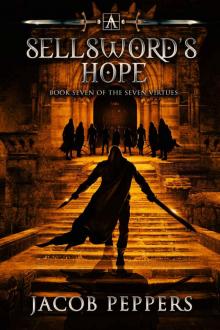 A Sellsword's Hope
A Sellsword's Hope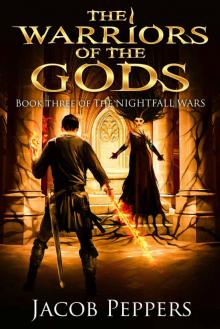 The Warriors of the Gods
The Warriors of the Gods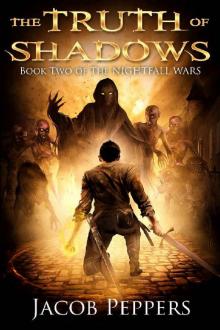 The Truth of Shadows
The Truth of Shadows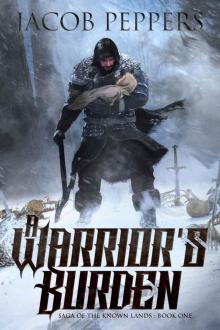 A Warrior's Burden: Book One of Saga of the Known Lands
A Warrior's Burden: Book One of Saga of the Known Lands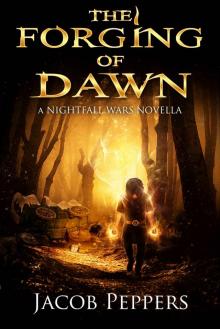 The Forging of Dawn
The Forging of Dawn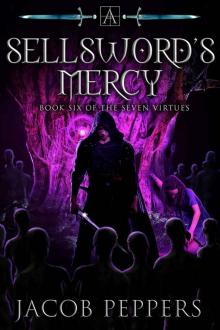 A Sellsword's Mercy
A Sellsword's Mercy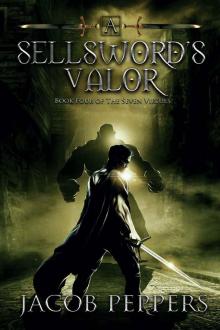 A Sellsword's Valor
A Sellsword's Valor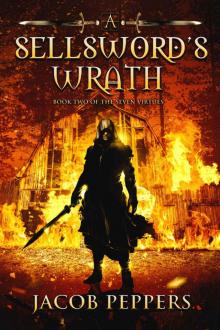 A Sellsword's Wrath
A Sellsword's Wrath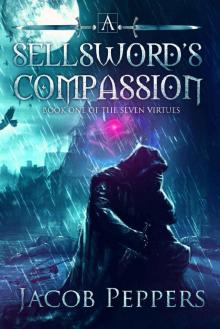 A Sellsword's Compassion_Book One of the Seven Virtues
A Sellsword's Compassion_Book One of the Seven Virtues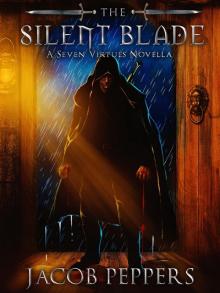 The Silent Blade: A Seven Virtues Novella
The Silent Blade: A Seven Virtues Novella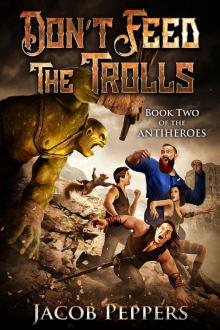 Don't Feed the Trolls
Don't Feed the Trolls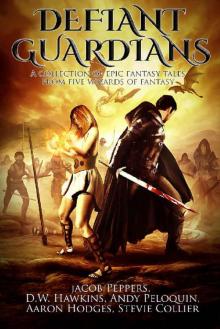 Defiant Guardians Anthology
Defiant Guardians Anthology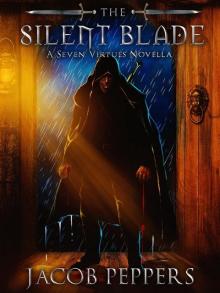 The Silent Blade
The Silent Blade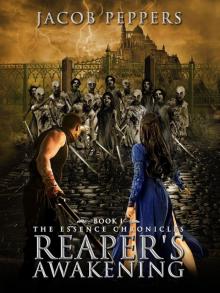 Reaper's Awakening
Reaper's Awakening